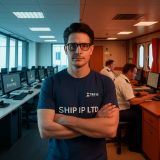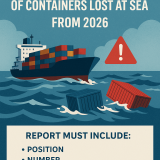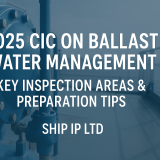In its annual report for 2021, CHIRP Maritime included a single known case of a master who deceived port officials and denied the presence of COVID symptoms aboard his ship. “While this is the first such report to be received by CHIRP Maritime, it is unlikely to be an isolated case but rather the tip of an under-reported industry-wide problem,” the organization reported.
Case study outline: A conscious decision not to declare notifiable disease symptoms on board when entering port put the pilot, dockworkers, and the wider community at risk.
What the reporting crewmember told CHIRP:
Following a full crew change in port, the vessel sailed that evening and went to anchor outside the port. Soon after joining, two of the crew exhibited COVID symptoms – one of them later learned he was a ‘close contact’ with a confirmed COVID sufferer – both seafarers were isolated on board.
Initially, the master kept the presence of symptomatic crew quiet, choosing not to inform the vessel’s management company. Additionally the master falsified the seafarers’ temperature records by asking them to stand outside in the cold before recording their temperature. When the master was persuaded to inform the company (as per the COVID management plan), the company instructed the master not to disclose the issue. The vessel remained at anchor.
The symptomatic seafarers were employed through a manning agency, which applied pressure to the management company to conduct COVID tests. Three days after COVID symptoms were first exhibited, the management company instructed the vessel to proceed into port. The two symptomatic seafarers would be replaced on board and then accommodated and tested ashore.
During the phone call with the company, the captain volunteered to lie to the harbor authorities about having COVID symptoms onboard. (The port asks all arriving vessels “if they have reportable symptoms on board.”) The company accepted the captain’s offer.
Subsequently, the vessel entered port without informing any authority of the reportable symptoms on board. The pilot who boarded the vessel was not informed of the symptomatic crew and neither was the taxi driver whodrove the two seafarers to their accommodation ashore.
The day after the symptomatic seafarers were taken ashore, two replacement crew joined the vessel. Only one of them had been informed of the suspected coronavirus on board the vessel before they joined. The vessel departed the harbor after embarking the two crew replacements and taking on food stores. The vessel did not take a pilot for sailing.
Five days after the symptomatic seafarers were landed ashore (and 8 days after their symptoms first appeared), the two seafarers were finally tested by a private company. The test results were positive for coronavirus. Sometime later, the two previously symptomatic seafarers were re-tested – the results came back negative for coronavirus. The company offered them employment on another vessel, but they declined and their contracts were terminated. Their manning agency paid for alternative accommodation and flights back to their home country.
After departing the harbor, no further symptoms presented on board.
The reporter had contacted the DPA, but only after the two crew members were landed ashore, which the reporter recognized was too late. Earlier action might have led to a better outcome with proper procedures followed and safety precautions in place for the pilot and the taxi driver. However, the conversation between the master and the company had been with the company directors, by-passing the DPA. It is unclear if the DPA would have had any influence given the direct relationship between the master and company directors.
In response to questions, the reporter noted the following: there are many human element failures within this report including the reporter’s own. Whatever the captain’s misguided reasoning for offering to lie to the authorities, the company should have declined and instructed him to make a full and honest declaration to the port authorities.
Finally, the reporter thought that there must be other vessels in similar situations waiting outside ports in various parts of the world.
CHIRP comment
The CHIRP Maritime Advisory Board (MAB) noted the following points.
• This report identifies an absolute violation of the WHO International Health Regulations (2005) concerning the requirements to report the presence or suspected presence on board of a notifiable disease. Beyond the regulations are questions of moral and ethical integrity.
• Long established by the WHO, IMO, and ILO is an obligation on the master of a ship to make an accurate declaration when entering port.
• Early in the coronavirus pandemic, a broad coalition within the maritime industry came together to produce a framework of protocols to facilitate safe crew changes and repatriation. On 5th May 2020, IMO issued a Circular Letter (No.4204-Add.14), informing shipping companies of the recommended framework of protocols.
• This report concerns a recent incident which was a wilful breach of the regulations and those established protocols, not just by the master but by the management company as well. Given the potential harm to those individuals involved in repatriating the two seafarers with symptomatic Covid-19 conditions, pilot, crew, agents and taxi driver, this case highlights the imperative to properly report any notifiable disease.
• COVID restrictions and quarantine have both direct and indirect consequences on seafarers and additionally on a ship’s ability to continue to work cargo. All such issues can be compounded by restrictive charters and inflexible charter parties.
• The reporter also highlighted that the master engaged directly with the company’s directors and by-passed the Designated Person Ashore (DPA) (The DPA is the authorised direct link between the ship and the highest level of management of the Company who is responsible for ensuring the safe operation of the ship.)
While this is the first such report to be received by CHIRP Maritime, it is unlikely to be an isolated case but rather the tip of an under-reported industry-wide problem, made possible by lack of enforcement.
As far as CHIRP Maritime is aware, the company has not carried out an internal investigation so there are no lessons learned from this incident. However, CHIRP Maritime feels it is incumbent on all shipping companies and masters to understand the reporting requirements for reportable diseases and to make accurate declarations. Notwithstanding any charterer’s contractual agreements, the master must ensure that the regulations are robustly adhered to and that reporting via the correct channels is followed.
The CHIRP (Confidential Human Factors Incident Reporting Programme) Charitable Trust has provided a totally independent and confidential safety reporting system to seafarers worldwide since 2013, complementing the reporting system it has offered to the UK aviation industry since 2003. By publishing our analysis of received incident and near-miss reports we raise awareness of safety issues and contribute to improved safety outcomes through all sectors of the maritime industry.





